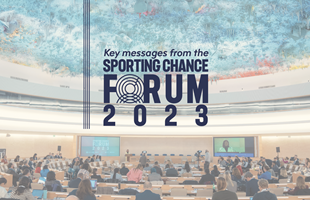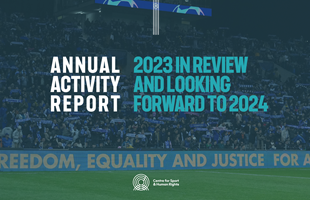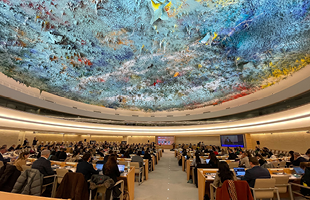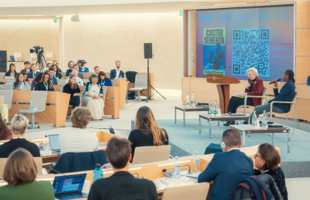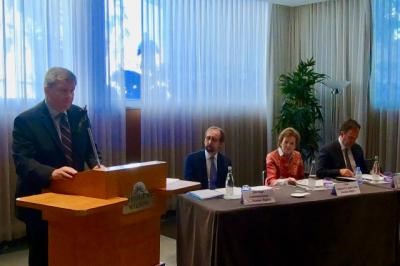
The text of this speech originally appeared on the ILO website.
On 26th June 2018, the Centre for Sport and Human Rights was launched in Geneva.
Marking the official launch, the nearly 40 founding members of the Advisory Council of the new Centre were welcomed with remarks by the UN High Commissioner for Human Rights Zeid Ra’ad Al Hussein, the Director-General of the ILO Guy Ryder, and the Centre’s founding Chair Mary Robinson (former President of Ireland and former UN High Commissioner for Human Rights).
John, High Commissioner Zeid, Mary, friends, ladies and gentlemen,
The football World Cup takes place as a helpful backdrop to this event, and provides perhaps a reason for the high levels of energy in this room! It reminds us of why sport so important to us, of its commitment, skill, elegance, cooperation, and respect. It brings peoples and nations together in friendship that can be difficult to find in the world today.
We associate universal values of fair play, human achievement, health and happiness with great sporting performance but these values that we feel deeply and instinctively will only remain untarnished if they apply also to the many millions on whose daily work this massive global industry depends. Our vision is “a world of sport that fully respects human rights”. We are aiming high. And we launch the Centre for Sport and Human Rights because the industry depends not only on star athletes – who also have rights – but on the work of the millions who build the sports parks, construct the stadia, manufacture the panoply of sporting goods (often in very complex supply chains), and provide the services and catering that make mega-sporting events possible.
And that complexity is also why the multi-stakeholder approach that we are putting together is so important. The sports industry doesn’t have only a business case to put things right because of considerations of a legal and ethical nature; it has obligations based on universal human rights and the enduring values of sport – to ensure that the edifice of great sport is not built on a bed of sand of low pay, dangerous working conditions and violations of rights at work. We share a duty to ensure that the freedom of sport is not built on the un-freedom of others.
These were among our concerns when we all agreed to establish a Platform on Mega Sporting events and Human Rights in November 2015.
Long before that, indeed before the Euro 1996 tournament, at the ILO we discovered children in Pakistan – some as young as six years old – stitching footballs. Children who would never go to school, let alone have the chance to buy or to play with one of the balls they were making.
That led to a programme of work with the Pakistani employers and trade unions, and with the brands, the World Federation of Sporting Goods Industries and global union federations. It showed that all fundamental rights at work must be promoted together, in the sporting goods sector and beyond.
Since Euro 96 and the ensuing work in the sporting goods sector, we have seen the successful PlayFair collaboration at the 2012 London Olympics. And last November the ILO signed what we believe to be a very important agreement with the Government of Qatar to prevent forced labour – commonly linked to the kafala system - and to improve working conditions for migrant workers in particular. We have opened an ILO project office to assist the government to fulfil its obligations concerning the 2022 World Cup. In this respect, I want to acknowledge the role of the Platform on sports and human rights in engaging FIFA and the Supreme Committee for Delivery and Legacy of Qatar 2022.
We have achieved much more, but there is still a mountain to climb. The establishment of the Centre for Sport and Human Rights is a sort of base camp for the ascent that we must still make. It is a great achievement in its own right.
The Centre must enable us to transform interim or episodic activities into a new, self-sustaining institution to engage independently with all sports actors. The Centre’s mandate is rights-based; it is inclusive and diverse, reflecting the opinions and needs of affected groups; and it is accessible to all with the objective of benefiting developing and emerging countries - including at the local level. It will partner with sports bodies, building trust.
Colleagues, in all of this, tripartism and social dialogue between governments, employers and trade union organisations are important instruments. They are embedded in the work of the ILO and I believe that they can well serve the Centre. The ILO is proud to be a member of the Centre’s Advisory Council – and I would like to thank the ILO tripartite constituents for their guidance and commitment namely the IOE, the ITUC and its partner global federations UNI, World Players and Building and Woodworkers International, as well as Sport Rights Alliance for their commitment and contribution.
As the High Commissioner has indicated, by adopting human rights standards and policies, sports organisations like FIFA, UEFA, the Commonwealth Games and the IOC have sought to address human rights in their Charter, in bidding, and in selecting bid cities.
In doing so they have referred to the ILO Declaration of Fundamental Principles and Rights at Work of 1998 which commits Member States of the ILO to respect the four categories of fundamental principles and rights at work: freedom from child labour, forced labour and discrimination; and respect of freedom of association and rights to collective bargaining. All member States have an obligation to promote, respect and realise these universal values, whether or not they have ratified the relevant Conventions.
I wish to sincerely congratulate every organisation, institution and entity involved for their efforts towards greater understanding and collaboration to promote these rights. The IOC and other sport institutions, now familiar with our 1998 Declaration, can be assured that they are extremely welcome to request our technical advice and support, and our assistance in their dialogues with bid cities on such matters.
That, in itself, is already a major achievement of the Centre. We have come a long way in a relatively short space of time. Its immediate future work – sharing knowledge, building capacity, increasing the accountability of stakeholders, providing remedies for affected groups – will have to be developed in a planned and coherent manner.
But with all of this I am conscious of one thing – that the wider public seems largely unaware that sport bodies are committed to better governance, accountability and sustainability. That can be seen in a certain ambivalence about hosting mega sporting events that has been expressed by many of the local people in venues that have been under consideration. That points to a need to communicate our collective achievements better and more consistently.
The Ambassadors appointed for the Centre will need to be able to tackle not only sport-related issues but also those concerning sustainability, and labour and other human rights.
We look forward very much to the Centre’s next steps, including a meeting on remedies in The Hague and a fourth Sporting Chance Forum in Paris. Greater cohesion within the UN System is very much on the agenda these days and it is most welcome that UNESCO, with the overall UN mandate on sport and physical education, has joined the Centre and will host the next Forum in Paris – the city of the coming summer Olympics.
A number of new partners, including governments and the European Union have shown their interest, commitment and trust by joining the Centre. We hope that they will be followed by many more.
Let me conclude with some thanks:
Mary, your commitment and leadership at the head of the process are very much recognized and appreciated. I want to thank you again for chairing our endeavours and for agreeing to stay on to lead the next phase.
John Morrison and his IHRB team, you have done the heavy lifting and a tremendous, complex and essential job in building bridges between us all over the last three years. Thank you all.
Finally, please permit me to thank the Government of Switzerland for hosting the Centre and for its tireless support for our new coalition.
Good luck to the Centre.
Thank you.

